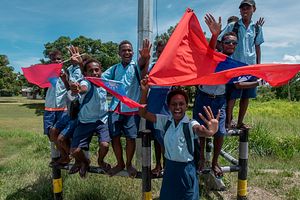Australian Prime Minister Scott Morrison will make his first overseas trip since retaining his position by visiting the Solomon Islands this coming weekend. This will be Morrison’s second visit to the Pacific as prime minister, after he made trips to Vanuatu and Fiji in January. His impending visit comes not only after Australia’s recent election, but the Solomon Islands’ April election, which saw Manasseh Sogavare returned to the prime ministership for the third (non-consecutive) time.
Morrison’s visit to Honiara is a further demonstration of his government’s commitment to its “Pacific Step-Up” — Canberra’s desire to re-engage with the region in the face of increasing strategic competition from China. A growing number of Pacific Island states are forging agreements with Beijing as part of China’s Belt and Road Initiative, and while this is potentially positive if it can help develop the region’s infrastructure, other powers like Australia and the United States remain wary of what an increased regional footprint from an authoritarian China could mean for established norms in the Pacific.
As a region that hosts a number of states that do not diplomatically recognize Beijing, the South Pacific is susceptible to the push and pull of large power rivalries. China’s rapidly expanding reach could prove destabilizing as it seeks both influence and recognition (in all senses of the word). Since the election of Tsai Ing-wen as Taiwan’s president in 2016, Beijing has been especially proactive in tempting away Taipei’s diplomatic partners, enticing five countries to switch in the past three years.
This is keenly felt in the Solomon Islands, one of six Pacific Island states (alongside Nauru, the Marshall Islands, Tuvalu, Palau, and Kiribati) that diplomatically recognize Taiwan rather than China. Despite the lack of formal diplomatic relations, China is the Solomon Islands’ largest trading partner, with the Chinese demand for lumber having a considerable effect on the Pacific nation’s ecosystem, and political system.
The weight of this economic relationship places significant pressure on the Solomon Islands to switch its diplomatic recognition to Beijing. Prior to the election, former Prime Minister Rick Hou instigated a review of the country’s position, and Prime Minister Sogavare is under pressure from members of Parliament to instigate a switch. However, on a recent trip to Canberra, U.S. Acting Assistant Secretary for Southeast Asia W. Patrick Murphy made comments that indicated that the United States is keen to maintain the status quo.
This is where Morrison’s trip to Honiara comes in. Without directly stating such a position, it could be assumed that Morrison’s visit is designed to try and preserve the Solomons’ recognition of Taiwan. While the recognition of Taiwan by the six Pacific Island states noted above helps prevent a greater diplomatic footprint by Beijing (alongside the fear of a military footprint), it also serves a purpose in preserving the strategic ambiguity of both the United States and Australia in relation to the China-Taiwan debate.
The reality of China’s power in comparison to Taiwan’s is unquestionable, and this creates enormous pressure to recognize this reality and normalize relations with Beijing. This was obviously the calculation made by much of the West in the 1970s when these states decided to recognize the CCP’s status as the governing entity of China. However, this was done in a carefully constructed manner in order to provide enough ambiguity in their positions so as not to completely abandon Taiwan to CCP control. The United States and Australia may no longer formally recognize Taiwan and its government, but they see clear value in that government being allowed to operate without CCP interference — including on the world stage.
For countries like Australia and the United States, who remain suspicious of a CCP-led China, it is therefore desirable for Taiwan to maintain its dwindling number of diplomatic partners. And countries like the Solomon Islands that resist the pressure to recognize Beijing are key to this. This is not to suggest that states like the Solomon Islands are simply pawns in a larger strategic game. Their reasons concerning which states they recognize remain their own. Yet while smaller states are often deemed to suffer what they must, as (unfortunately) less noticeable and prominent players in the global community, they are able to maintain a strategic flexibility that larger states cannot.
This flexibility to negotiate the complexities (both positive and negative) of Beijing’s growing power will continue to be an issue for Honiara regardless of any decisions they make concerning diplomatic recognition. And the desires of countries like Australia and the United States don’t make these choices any easier. However, Morrison recognizes that it would be unwise to push too hard on the subject, stating this week, “You can’t come across as too hypocritical here because we have our diplomatic relationship with the People’s Republic of China rather than Taiwan.” Finding a position respectful of Honiara that also maintains Canberra’s strategic desires will require a deft touch.

































